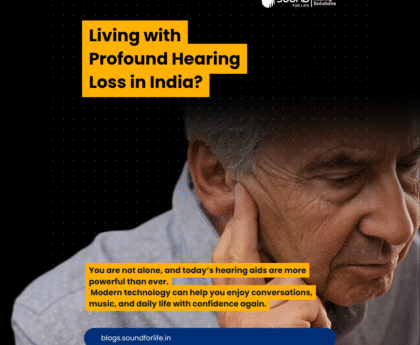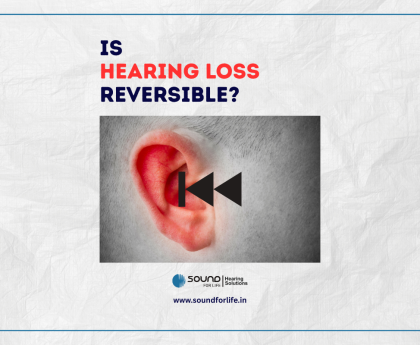Hearing loss is common as people get older. In fact, about one-third of adults between the ages of 65 and 74 and almost half of those over 75 have some hearing loss. But presbycusis, or age-related hearing loss, happens so slowly that many older adults don’t even realise they are missing sounds. For adults, children and care takers, being able to spot the early warning signs can make a big difference in getting help for a parent. This article will talk about the common signs of hearing loss that comes with age, the behavioural and emotional changes it can cause, and why it’s important to deal with it. We will also talk about how to talk to a parent about it in a gentle way, the benefits of hearing aids, what happens during a hearing test, and where to get help in India (including SFL Hearing Solutions’ network of clinics). By the end, you will know what to do next to help your loved one hear better.
Common Signs of Age-Related Hearing Loss
People who are older often have trouble hearing high-pitched sounds at first, and then their speech becomes less clear over time. Here are some warning signs to look out for:
- Asking people to say things again and again.
A parent may say “What?” or “Huh?” a lot and ask you to say things again, especially when you’re talking. This could mean that they don’t understand parts of speech very well.
- Making the TV or radio very loud.
If your parents are turning up the volume on electronics to levels that bother you, it could be because they can’t hear well. A common sign of hearing loss is loud noise.
- It’s hard to follow conversations when there is a lot of noise.
It can be annoying to be in a busy place, like a restaurant or a family gathering. Presbycusis is a condition that makes it hard to understand speech, especially when there is background noise.
- Speech sounds “muffled” or “mumbled.”
Your parents might say that voices or TV dialogue sound slurred or unclear. They often miss consonant sounds like “s” or “f,” which makes normal speech sound jumbled.
- Not hearing high-pitched sounds.
Older people may not be able to hear things like bird songs, doorbells, or the voices of children or women as easily. If your parents don’t respond when you call their name softly or don’t hear the phone ring, they may have hearing loss.
- Tinnitus is when your ears ring or buzz.
A lot of people who lose their hearing as they get older also have tinnitus, which is a constant ringing or hissing sound in their ears. If your parents talk about ringing in their ears, that’s another sign that you should get your hearing checked.
If you see these symptoms happening over and over again, you should think about getting your hearing checked. It’s important to find out about hearing loss early; on average, people wait 10 years before getting help. But catching it early means faster relief and better results.
Behavioral and Emotional Changes Linked to Hearing Decline
Hearing loss doesn’t just affect the ears, it often impacts behavior and mood. When a parent starts struggling to hear, you may see:
- Social withdrawal or isolation.
Many people with hearing difficulty avoid group situations because following conversations becomes tiring and frustrating. They may skip family events, dinners, or gatherings where there is background noise. Over time this can lead them to feel left out, lonely, or “tuning out” of family activities.
- Frustration or irritability.
Straining to hear can be exhausting. Your parents may get annoyed easily, snap at caretakers, or seem unhappy for no clear reason. This is often because every interaction feels like a struggle. According to the National Council on Aging, losing the ability to hear can dramatically change how one interacts and may cause a person to feel “separate from the rest of the world.
- Embarrassment or avoidance.
Some seniors feel embarrassed about not understanding others. They might pretend to hear when they haven’t, and then feel awkward or suspicious (even paranoid) if they think people are talking about them. They may stop answering the phone or refuse to go out, because each missed word is humiliating.
- Signs of depression or anxiety.
Hearing loss doubles the risk of cognitive decline and can increase the likelihood of depression and anxiety. In fact, one study found older adults with untreated hearing loss were 47% more likely to show depressive symptoms. If a once-vibrant parent starts showing low mood, loss of interest in hobbies, or seems to be constantly worried, untreated hearing problems might be a contributing factor.
- Paranoia or misunderstanding.
As one audiologist notes, not hearing well can lead someone to feel inadequate or even believe others are judging them. This can cause someone to behave differently (e.g. speaking out of turn or avoiding conversation) because they feel lost or overwhelmed.
These emotional and behavioral changes are subtle and can develop slowly. Keep in mind they are signals – not intentional behaviors. Offering understanding and support (rather than frustration) can make it easier for your parents to accept help.
Health and Social Impacts of Untreated Hearing Loss
Not paying attention to hearing loss isn’t just annoying; it can also be bad for your health. Studies show that seniors who don’t get treatment for hearing loss are more likely to have:
- Cognitive decline and dementia.
Studies indicate that even mild hearing impairment doubles the subsequent risk of dementia, with the risk increasing proportionally to the severity of hearing loss. Hearing uses the brain’s listening pathways, and if those pathways aren’t used, the brain may shrink faster. By helping your loved ones you are helping them in keeping their brain healthy.
- Falls and accidents.
We usually think about vision, but hearing also helps us stay balanced and aware. People who can’t hear well are more likely to fall and get hurt because they can’t hear things like traffic or alarms. Johns Hopkins research even connects hearing loss to trouble walking.
- Depression and anxiety.
As mentioned, seniors who don’t get help for their hearing loss are much more likely to feel anxious or depressed. The American Academy of Audiology found that older adults who don’t use hearing aids are more likely to be depressed, anxious, and even paranoid than those who do.
- Reduced quality of life.
Watching TV, talking on the phone, and chatting with grandchildren are all things that can stress you out. Hearing barriers can make things that a parent loves to do, like reading, gardening, and hanging out with friends, less enjoyable. Over time, this can make family relationships tense and make people feel frustrated or dependent.
- Social isolation.
Older adults often stop going to community events, clubs, or hanging out with friends because they have trouble talking to people. Being alone can make your health worse. Seniors who are lonely are more likely to have heart disease, trouble sleeping, and other health problems.
The good news is that a lot of these risks can be lowered. Hearing aids can help seniors communicate better, feel better, and stay active and interested by treating hearing loss.
Talking to Your Parent About Hearing Loss
It can be hard to talk to an older parent about hearing loss. It’s important to talk about the subject with understanding and patience. Here are some tips from professionals:
- Pick a good time and place.
Take a break and find a quiet, private moment when you don’t have to hurry. Maybe after a casual dinner or a quiet walk. Make sure there is good lighting and no distractions so they can see your lips.
- Stick to the facts and use “I” statements.
Rather than saying, “You don’t hear well or you are listening properly,” try saying something like, “Dad, I have noticed that you sometimes ask me to repeat things on the phone.” I’m a little concerned with your hearing. Have you experienced that? This makes it sound like a worry instead of a criticism.
- Be clear and helpful.
Show that you’re paying attention and that their hearing loss is affecting daily life by mentioning specific moments, such as, “I noticed you didn’t hear the doorbell again,” or “Last night you seemed to struggle with the movie’s dialogue.” Let them know your goal is to help them enjoy conversations and stay connected with family. For example, an audiologist might encourage them to think about what matters most—like clearly hearing their grandchildren—so they feel motivated to find a solution.
- Understand their feelings.
Know that your parents might feel ashamed or angry. Allow them to show their anger or denial. Say things like, “I can see how this might be hard to talk about,” and then listen. If they’re defensive, don’t be upset. Hearing loss can feel like admitting you’re getting older, which many people don’t like.
- Talk about the benefits of dealing with it.
Avoid just talking about negative; also talk about positive. For example, “I really miss our long conversation over the phone because I can’t hear you well.” Think about how nice it would be to talk about your day again without having to ask me to repeat myself. Or mention the benefits of using modern hearing aids that are compact and simple to operate.
- Suggest a quick check.
You could suggest that you both take an online “hearing quiz” or just say that it’s time for a routine check-up “because it’s been a while.” Knowing that it’s just a test, like an eye exam, can sometimes help ease your mind. Some carers even go with their parents to the audiologist to give them moral support.
- Be patient and positive.
Think of hearing health as just one part of being healthy overall. Make sure to stress that modern solutions can be helpful, not a burden. Give them time to think about it, and if necessary, bring it up again in a gentle way. It might take a few tries before your parents are ready.
If you show empathy and work together, you can help your parents feel loved instead of judged. Remind them (and yourself) that it’s normal to ask for help. Many people with hearing loss go untreated for more than ten years, but there’s nothing wrong with saying you need a little help.
The Benefits of Hearing Aids
Hearing aids are often the first thing people are told to do when they find out they have hearing loss. This is how they can help your parent:
- Communication has been restored.
Hearing aids make sounds louder and make speech easier to understand. This makes it easier for your parents to hear everyday sounds like conversations, TV, phone calls, and more. They won’t have to guess or read lips as much, which makes things less frustrating.
- Technology that is more advanced.
Today’s hearing aids come with highly advanced technology. Many hearing aids now feature digital sound processing that makes speech clearer while reducing background noise. Advanced features like directional microphones, noise reduction, and feedback cancellation are especially useful in busy settings such as restaurants or family gatherings. Some aids can connect to phones or TVs via Bluetooth, so your parents can listen to audio directly. They are discreet, almost invisible styles, and many of them come with batteries that can be charged again.
- A better quality of life.
Research shows that using hearing aids can improve social connections, boost mood, and support overall well-being. Hearing well and clear help keep the brain active and engaged. In fact, addressing hearing loss early may slow down cognitive decline and reduce the risk of dementia. They also make daily life safer by helping you hear important sounds like alarms, traffic, doorbells, and other alerts.
- Better relationships.
Family talks are fun again when your parents can hear better. Less misunderstandings and missed words, which lowers stress. Everyone, including the family, will feel like they have been heard and will be closer.
- Freedom and self-assurance.
If you can hear well, your parents won’t have to talk to other people as much. They can go to parties, watch films, or talk on the phone without worrying about anything, which makes them feel more independent.
- Benefits for the mind.
Making a hearing aid part of your life can help you feel less alone, anxious, and depressed. Experts say that improving your hearing “can help keep your self-esteem high and your social calendar full.” Hearing Loss that isn’t dealt with can make people feel isolated. Amplification helps seniors join in on the conversation again.
If cost is a concern, keep in mind that a lot of hearing clinics offer financing or discounts, and some government programs may help seniors. The main point is that hearing aids today are not the big, heavy things they used to be. They can really make life sound better and richer.
What to Expect During a Hearing Test
It’s easy and painless if your parents agree to a hearing test. An audiologist or hearing care professional will do a number of tests to see how well you can hear. This is what usually happens:
- Pure-tone testing.
Your parents will wear headphones and sit in a soundproof booth. The audiologist will play beeps or tones at different pitches (high and low) and volumes, one ear at a time. Every time your parent hears a sound, they will respond in some way, like pressing a button or raising their hand. This finds the quietest sounds they can hear across all frequencies.
- Speech audiometry.
Next, they might be able to hear recorded or live speech through the headphones. The audiologist plays words at different levels and asks your parents to say them back. These checks help them determine how well they can understand speech when everything is perfect.
- Tympanometry and middle-ear tests.
A probe can be put in the ear to check how well the eardrum works and how much pressure is in the middle ear. This helps rule out problems like wax or fluid buildup. (This is quick and doesn’t hurt.)
- Other tests.
They might do more tests, like bone conduction tests or otoacoustic emissions, to figure out what kind of hearing loss you have, depending on your age and the case. But for most older people, the main tests are pure-tone and speech tests.
A normal hearing test for adults takes about 30 minutes and doesn’t hurt at all. You don’t have to do anything but listen; there are no needles or loud noises. The audiologist will give your parents an audiogram, which is a chart that shows how well they can hear. They’ll tell you if you have normal hearing or some level of hearing loss in each ear.
If the audiologist finds that your parent has hearing loss, they will go over the options, which often include hearing aids that are made just for them. They might also check your balance or suggest that you see an ENT specialist if you need to. Either way, going to the test with your parents (or soon after) helps everyone understand what the results mean.
Getting Professional Help in India
Hearing care is becoming easier to get in India, which is a good thing. Most big cities and towns have audiologists and hearing specialists. Here’s what you should do:
- Consult an audiologist or ENT doctor.
A lot of hospitals and clinics have audiology departments. You can get a referral to an audiologist from your family doctor. These professionals are skilled in testing hearing loss levels and making the best recommendations according to their findings.
- Hearing clinics and chains.
One example of a big hearing health network in India is SFL Hearing Solutions (Sound for Life). Their website says they are “the fastest growing multi-level, multi-brand chain of hearing healthcare clinics with operations all over India.” This means that SFL has offices in many cities and states all over the country. SFL actually lists hearing centres in many places, including Delhi-NCR, Mumbai, Kolkata, Bengaluru, Kerala, and many more. You can usually get a free hearing test from a qualified audiologist at an SFL centre or a similar audiology clinic.
- National programs and NGOs.
Some government hospitals or nonprofit groups may offer free or low-cost hearing tests and hearing aids to seniors. You are advised to look into local health centres that offer such programs for seniors.
- Hearing aid retailers.
You can get hearing aids from authorised dealers, if a hearing test result shows that you have lost your hearing. For example, SFL has a lot of different brands and styles of hearing aids. They often let your parents try out hearing aids before they buy them. Other big hearing aid companies also have stores in Indian cities.
- Online resources.
A lot of clinics now have online hearing tests or quizzes. But these shouldn’t take the place of a test in person. It’s best to have a professional check your results.
When choosing a clinic, make sure they have certified audiologists and good reviews. For example, SFL Hearing Solutions says they have “Certified Audiologists” on staff. You can call their help line (for example, SFL lists phone numbers like +91 90154 01540) to find out how to get a free appointment or what to expect.
No matter where you go, the most important thing is to do something. Most provinces have at least one audiologist or ENT doctor, even in smaller cities. If you live in a city, SFL’s presence all over India is helpful. They have stores in cities from Delhi to Bangalore to Kochi, so families all over the country can easily get to them. But many local clinics can help, even if you don’t live in a big city.
About SFL (Sound For Life)Hearing Solutions
If you’re interested in SFL Hearing Solutions, In India, SFL (Sound for Life) is a private chain of hearing care clinics. According to their website, “We are the fastest-growing multi-level, multi-brand chain of hearing healthcare clinics helping people hear again across India.” SFL runs clinics in many Indian states and cities, from Delhi and Punjab in the north to Kolkata and Chennai in the east and south, and from Mumbai and Gujarat in the west. They stress the importance of having trained audiologists and high-tech digital hearing aids at each centre. You can even make an appointment for a free hearing test and consultation on SFL’s website. If you go with SFL, their audiologists can help your parents pick out a hearing aid that works with their lifestyle, from testing to choosing one. Of course, SFL is only one choice; there are other good hospitals and providers in India as well.
The fact that Indian elders have options, regardless of the supplier they select, is crucial. Legally, qualified experts can sell and install hearing aids, and an increasing number of support services, such as maintenance and therapy, are becoming accessible.
Take the Next Step – Hearing Health is Important
Hearing loss may happen slowly, but it can have big effects. If you’ve seen any of the warning signs or changes in your parent’s behaviour, you should encourage them to do something about it sooner rather than later. Better hearing means a better quality of life for seniors because it keeps them active, safe, and independent.
What can you do now?
Schedule an appointment now for your parents to have a hearing test. Many clinics, like SFL Hearing Solutions, offer screenings for free or at a low cost. You can find out where they are with a quick test. If you are sure you have hearing loss, there are friendly audiologists who can help you choose hearing aids that are discreet, comfortable, and made for older people.
Helping your parents hear better is a loving thing to do that will make family conversations better and make them feel better overall. Don’t miss another holiday dinner or phone call. Take the first step towards hearing today. Contact SFL Hearing Solutions or the closest hearing clinic to book a free hearing test and consultation right now. And you can call for a free home visit in your convenient time. Give your parents the gift of being able to hear life’s lovely noises once more, and spend many more years having deep talks with them.





